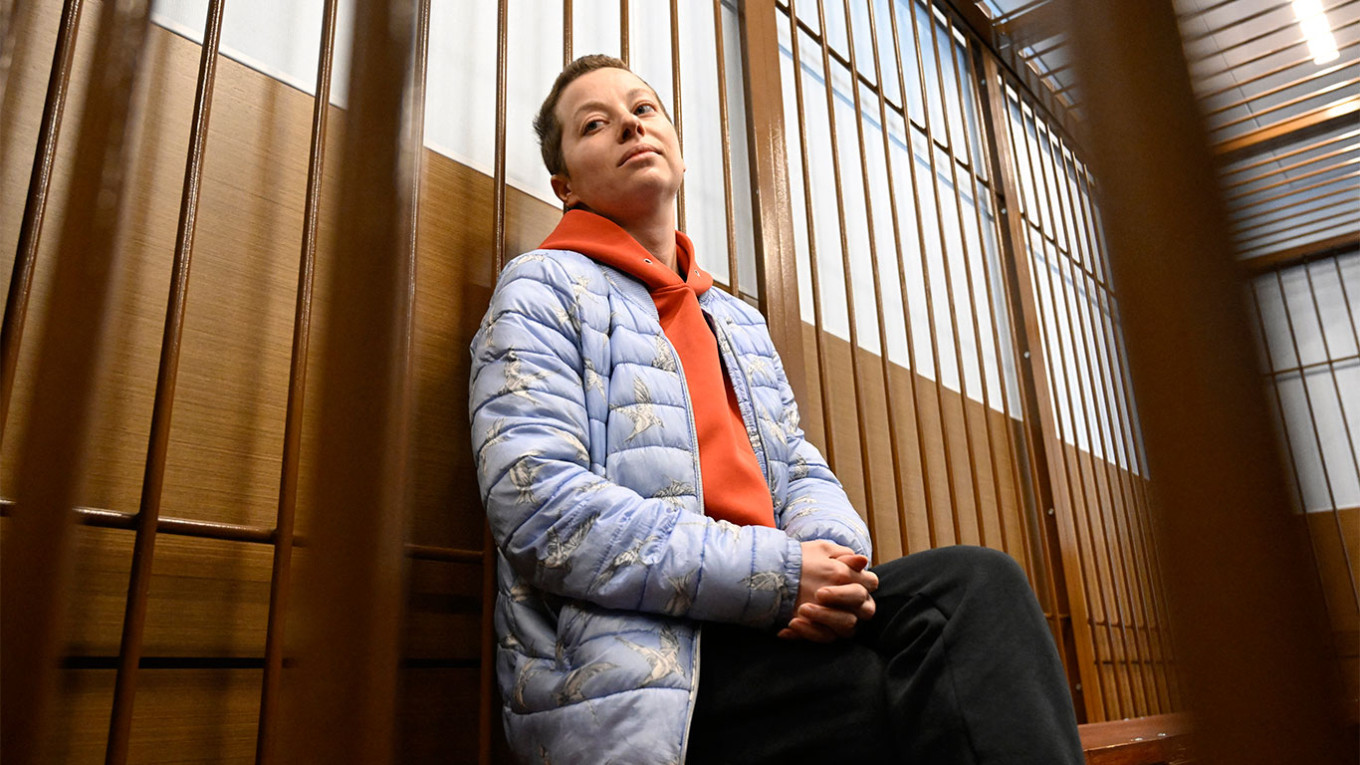Support for Yevgenia (Zhenya) Berkovich and Svetlana Petriychuk has flooded Russian media abroad and social media inside and outside Russia.
The director and author of the play “Finist the Brave Falcon” were taken into custody on May 5 for two months of pre-trial detention under the charge of “justifying terrorism.” The charge is punishable by up to seven years in prison.
Many commentators, however, believe that the real reason for Berkovich's arrest is her protest against the Russian invasion of Ukraine and anti-war poetry.
“Finist the Brave Falcon” was first performed in Moscow in 2021. It tells the story of Russian women who correspond with ISIS fighters, fall in love with them and plan to join them in Syria. In 2022 the play was nominated for four Golden Mask awards, and Petriychuk shared the prize for best play.
The play takes its name from a fairy tale and 1975 film about a brave man who is turned into a falcon by a supernatural monster. He can only be freed by the love of a pure young woman.
Since the detention of Berkovich and Petriychuk, friends, admirers, theater critics, artists, journalists and dozens of other people have written in their defense. Novaya Gazeta published a petition supporting the two women and calling for their immediate release. It was issued last Thursday with 300 signatures; by Tuesday it had more than 12,000 signatures by people from all professions, from nurses and computer programmers to bankers, couriers, artists, and actors. Most signed their full names and cities of residence in Russia.
Theater critics expressed outrage at what they see as a gross misunderstanding of the play. Alla Shenderova wrote that it didn’t glorify terrorists but is “a warning to teenage girls and women so that they don’t fall into the hands of terrorists. It’s not a justification of terrorism, but an exposé of its methods.”
Journalist and publicist Alexander Baunov noted that Berkovich and Petriychuk weren’t arrested for financial improprieties, as has been the usual practice in Russia, but for the play written by one and directed by the other. They are being charged “for an intimate, avant-garde theatrical production not easily understood that examines the psychological and social motivations that sent normal young Russian women (remember, there was a case of this at Moscow State University) into the arms of the “real men” – brave falcons – of ISIS. This is like arresting Dostoevsky for justifying the murder of old women after writing “Crime and Punishment” or for justifying terrorism for the novel “Demons.”
On his Facebook page film and theater critic Anton Dolin wrote, “Why is this case so outrageous, even against the background of the continued bombing? It’s because this is the first case — at least the first big case — of the Russian authorities punishing someone for art… this arrest is an acknowledgment of the power and danger that poetry and theater pose to a repressive system.”
Writers condemned not only the authorities but the person or people who denounced Berkovich and Petriychuk. This produced the digressions of speculation, accusation and counter-accusation that plagues the Russian intelligentsia. But contempt for the informant was rife. Journalist Catherine Gordeeva wrote, “The people who write denunciations bear as much responsibility for this vile act as the people who carry them out.”
On his Telegram channel theater and film director Kirill Serebrennikov addressed Berkovich, who had worked with him in Moscow.
“People who bomb Ukrainian cities every day; kill women, old people, and children; people who know no shame, who justify their crimes — it’s easy for these people to destroy 'some theater' or ruin the lives of 'some Zhenya Berkovich, Sveta Petriychuk and their families'.” But, he wrote, “You’re a Star. You’re Light. You’re Love. Those monsters will die in ignominy, while you’ll live on.”
You can read the text of the play in Russian here or watch the show on YouTube below.
A Message from The Moscow Times:
Dear readers,
We are facing unprecedented challenges. Russia's Prosecutor General's Office has designated The Moscow Times as an "undesirable" organization, criminalizing our work and putting our staff at risk of prosecution. This follows our earlier unjust labeling as a "foreign agent."
These actions are direct attempts to silence independent journalism in Russia. The authorities claim our work "discredits the decisions of the Russian leadership." We see things differently: we strive to provide accurate, unbiased reporting on Russia.
We, the journalists of The Moscow Times, refuse to be silenced. But to continue our work, we need your help.
Your support, no matter how small, makes a world of difference. If you can, please support us monthly starting from just $2. It's quick to set up, and every contribution makes a significant impact.
By supporting The Moscow Times, you're defending open, independent journalism in the face of repression. Thank you for standing with us.
Remind me later.






